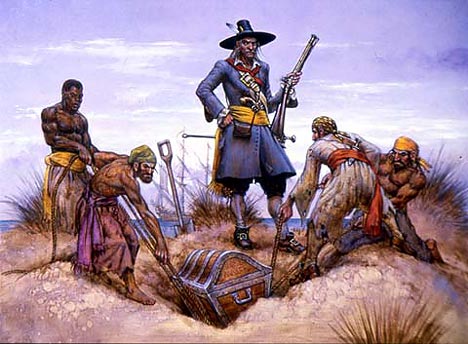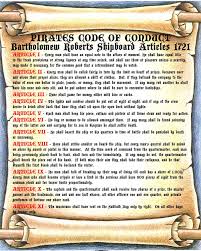The Pirate Code of conducts was a set of agreements that were signed between the Pirate Captain and his crew members that legally bound them to the profession.
There were no naval regulations for pirates during Elizabeth’s time. The pirate crew members who were called Articles and the pirate ships would have their own Code of Articles in order to maintain some control over the ship and its crew.
So, to ensure cooperation, civility and discipline among the crew members these laws were created. The Code of Articles were later known as the Code of Conduct.
The main idea was to ensure equality and a moral code of conduct among crew members and even the captain could lose his position if he violates the code of law.
Each pirate group designed their own code of articles governing the discipline, compensation for injured pirates, the division of wealth and so on.
The rules though slightly differed in each group were generally the same and were made in the interests of the crew members.
Every member would sign or make his mark on the articles followed by his oath of allegiance or honour.

Bartholomew Roberts or Black Barty
Bartholomew Roberts, the most successful pirates of the 17th century was known to have captured more than 400 ships in his lifetime. He was popularly called as “Black Bart or Barty”.
He and his crew members found the Bartholomew Roberts Shipboard Articles in 1721 which later on formed the foundation of the Pirates Code of Conducts.
Robert’s code was elaborate and rendered equality, which was by far the most important feature. The most typical punishment for breaking of any law was death by being marooned.

The Pirate Code of Conduct-The Bartholomew Roberts Shipboard Articles 1721
- Every man has an equal vote in all affairs of the ship. Equal title to fresh stock of food, provisions and strong liquor that was captured during the time of the raid. They can use them at all times except for times of scarcity.
- All men were allowed a fair division of prizes, looted wealth and a shift of clothes. No stealing or fraud against crew members on the board. Any man found guilty for even a dollar will be marooned. The punishment for robbing or defrauding a fellow crew member was even severe. His nose and ears will be slit and he will be left ashore to face further hardships.
- Gambling was strictly prohibited. Card games were allowed but no exchange of money or dice.
- All lights and candles to be put out at 8 ‘o’ clock at night. If anyone wants to drink after the hours, they have to do it without lights in the open deck.
- Always be ready with pistols and keep their cutlass clean and ready for service.
- No boy or woman allowed on the ship. If anyone was caught in the act of seduction or carried a woman to the sea disguised will have a death penalty.
- No man should desert their fellow crew members or the ship during the time of the battle. This was considered to be an act of cowardice and was punishable by being marooned or death.
- No quarrels or physical violence on board. For any unresolved dispute between two members has to resolve on shore by a sword fight or by a pistol.
- No man can break or relieve themselves from the pirate agreement until they have earned one thousand pounds. If a man was crippled or injured during his service, his earnings shall be reduced to eight hundred dollars.
- The pirate captain and quartermaster earned double the share of their crew members. The master, boatswain and the gunner earned one and a half share and other members earned one and quarter of the share.
- The musicians of the ship had to work all days of the week except for the Sabbath Day. They can take holidays under special considerations.
